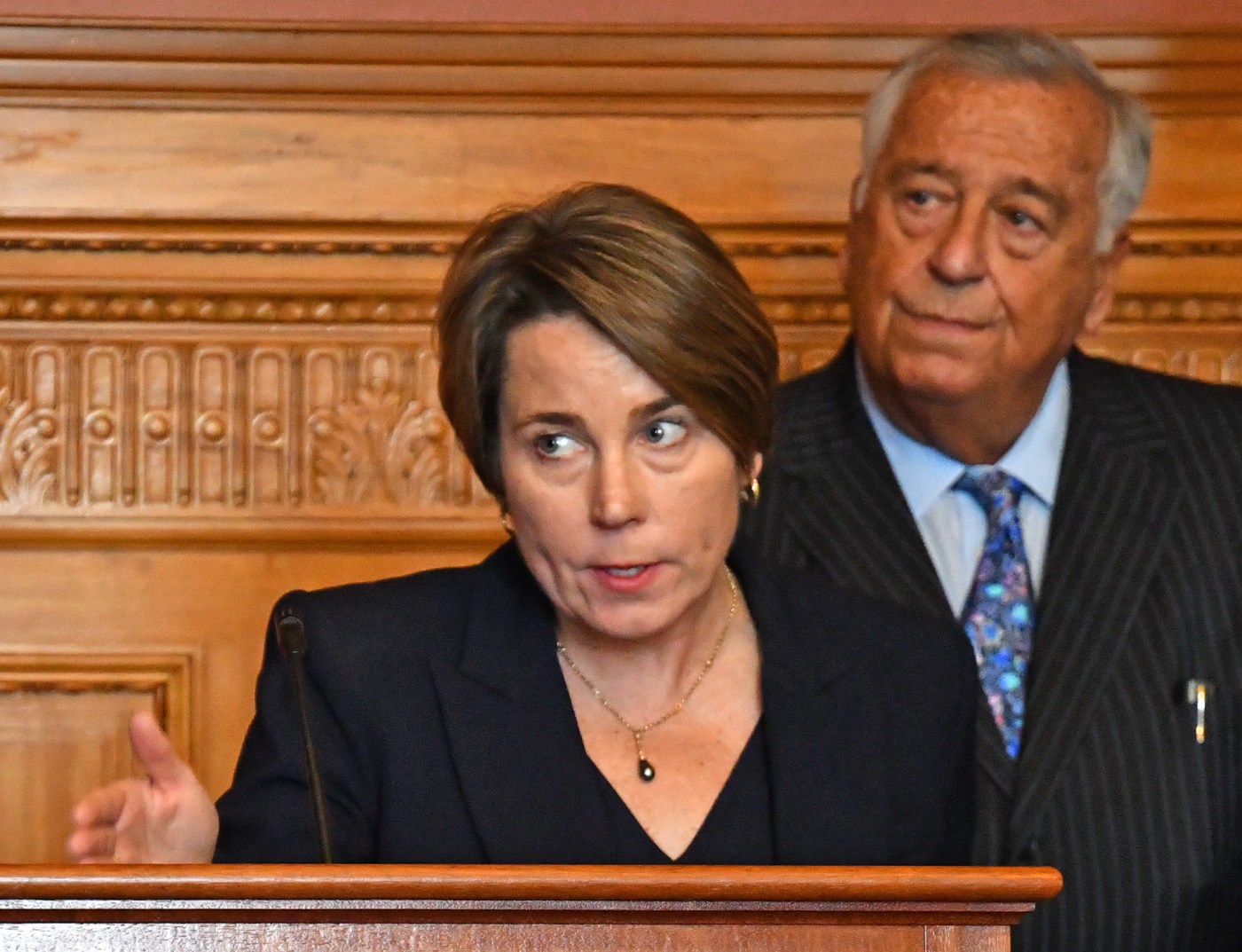
Maura Healey files $58B budget that banks on legislative buy-in to cover shelter spending
Gov. Maura Healey filed a $58 billion state budget Wednesday that banks on an unconvinced Legislature to approve the use of one-time dollars to meet the nearly $1 billion Massachusetts is expected to spend on state-run emergency shelters in fiscal year 2025.
Healey’s second budget proposal largely conforms to the slower post-pandemic revenue growth Massachusetts is expected to see by cutting about $1 billion in spending to balance out expenses. But the document still shuttles millions to the MBTA, education, and other transportation initiatives by relying on revenue from a voter-approved surtax.
The $58 billion budget that will head to the House for review is nearly 4% or $2 billion larger than fiscal year 2024, a move Administration and Finance Secretary Matthew Gorzkowicz argued was fair and balanced.
“Recognizing our tightening fiscal environment, this budget responsibly controls spending and limits growths without jeopardizing the progress and impact we’ve been able to make over the past year working to make our education systems, tax code, and housing more affordable for the people of Massachusetts,” Gorzkowicz said in a statement ahead of a 1 p.m. press conference at the State House.
Healey funded the emergency assistance shelter program — which is required under a decades-old law to provide housing to homeless families with children and pregnant people — at $325 million, the same amount her administration approved in fiscal year 2024.
But only weeks earlier, the state’s finance and housing departments projected Massachusetts will spend $915 million on shelters in fiscal year 2025, a staggering increase driven by a surge in migrant arrivals and crushing housing costs here.
In a separate spending bill filed Wednesday, Healey asked the Legislature to get on board with using $873 million in leftover dollars from the pandemic to cover budget gaps in the emergency shelter system this fiscal year and pay down costs in the next.
Even if Beacon Hill lawmakers agree to that plan — which they have already shown some hesitancy toward — Administration and Finance Secretary Matthew Gorzkowicz said the state will still need to make up a $91 million budget gap in fiscal year 2025.
An administration official said Healey did not increase shelter funding beyond $325 million — which can pay for 4,100 families — because they hope the surge in demand will eventually ebb. Baking in a large increase in spending, the official said, would mean slashing spending elsewhere.
Healey could face resistance in the Legislature, where top Democrats have expressed hesitancy with using the pandemic-era revenues to help the shelter system. Gorzkowicz said the administration does not have a backup plan if the Legislature does not agree to their idea.
Senate budget writer Michael Rodrigues said earlier this month he is “very protective” of reserve funds like the dollars Healey wants to tap into. House Speaker Ron Mariano said the shelter system is becoming “harder to support,” though he did not directly comment on Healey’s plan.
Healey’s budget proposal kicks into gear a months-long legislative process and comes after her administration said it would have $208 million less to craft the fiscal 2025 budget compared to the last year. But the spending document still pursues new initiatives by leaning on a 4% surtax on incomes over $1 million.
Tax revenues in fiscal year 2024 are expected to come in $1 billion below initial expectations and growth in the next fiscal year is projected to slow down compared to the boom times of the pandemic.
Healey proposed reducing line item spending in fiscal year 2025 by about $450 million and cutting down other areas by some $500 million, moves Gorzkowicz said were taken to constrain spending during challenging times.
MassHealth spending, the largest single line item in the budget, will only grow at 2.5%, a prison closure in Concord will save the state $16 million a year and $190 million in upkeep costs, and charter school reimbursements are decreasing by $44 million.
The governor also wants to use gambling-related funds to balance out the budget as well as $75 million in estimated revenue from moving the lottery online, a proposal that has previously been backed in the House but has not cleared the Senate.
Gorzkowicz said the Department of Revenue is looking to ramp up tax enforcement and compliance.
That means bringing on additional auditors and data analysts who can find out if taxes that are owed are paid. Cracking down on taxes is estimated to bring in $60 million in yearly revenues.
Healey is looking to siphon off up to $375 million in excess capital gains tax revenue — money that is typically deposited into the state’s rainy day fund — to help keep the budget stable.
Gorzkowicz said Massachusetts is expected to see around $513 million in total excess capital gains revenue, and the dollars that are not used to balance the budget will go to the rainy day fund.
The $1.3 billion in “Fair Share” or “Millionaires Tax” dollars will help boost funding at the MBTA, where Healey proposed doubling the operating dollars it usually receives from the state, and pay for new programs Healey teased at her State of the Commonwealth address earlier this month.
About $750 million will head to education initiatives, including providing free school breakfasts and lunches, free community college for adults 25 and older, and expanding access to child care financial assistance.
Another $550 million is earmarked for transportation, including $45 million for the implementation of a low-income fare relief program at the MBTA, $100 million for local road and bridge funding, and $56 million for safety improvements at MassDOT.
Healey also wants to allow residents in Massachusetts to change the sex listed on their birth record “to conform with their gender identity,” including by allowing a “X.”
Other policy proposals included in the budget would give people the option to update their marriage license for name changes and to remove sex.
The responsibility for compensating bail magistrates and bail commissioners would shift from the arrestee to the Massachusetts Trial Court under language included in the budget. Bail could also be set after court hours by remote or electronic means, according to the administration.

